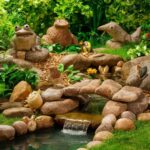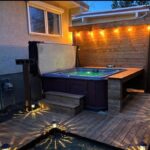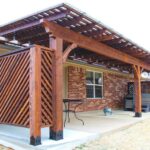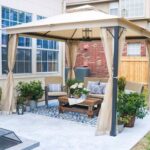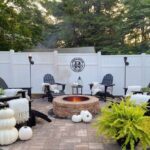An enclosed garden provides protection for your vegetable crops. It creates a safe space where plants can thrive without any harm.
These structures offer a favorable environment for growth, ensuring a bountiful harvest shielded from potential threats.
Key Takeaways
To protect your crops from birds, snakes, and insects, use bird netting with small openings. You can also build DIY enclosures like raised beds or glass domes for added protection. Introduce
. Use materials like galvanized steel or timber for sustainable garden enclosures.
Benefits of Enclosed Vegetable Gardens
Enclosed vegetable gardens protect your crops from pests like birds, snakes, and critters. The barrier around your garden keeps your plants safe. It creates a secure environment for your vegetables to grow well and lowers the risk of damage. The enclosure also makes it easier for you to access and care for your garden.
Having a garden enclosure saves time and effort in looking after your plants. It’s cost-effective in the long run because it helps your crops grow healthily. Investing in a garden enclosure means investing in the growth and health of your crops. So, think about setting up a garden enclosure to shield your crops and give them a safe place to thrive.
Types of Garden Enclosures
When choosing a garden enclosure for your vegetable garden, you have several options to consider:
- Stand-alone Garden Oasis: This option provides fenced-in surrounds and raised garden beds.
- Cottage-Style Garden: Utilizes existing fencing to create a charming enclosed space.
- Glass Dome Enclosures: These are movable structures that protect plants from pests and harsh weather.
- Raised Bed with Protectors: Ideal for poor soil quality and mobility challenges.
- Small Greenhouse: Uses vertical gardening to maximize planting space and crop yield.
Each option offers different features to suit your needs and preferences.
Importance of Crop Protection
Using bird netting in your vegetable garden helps protect your crops from birds, snakes, and insects that can harm them. This netting creates a safe environment for your plants to grow, reducing the risk of crop loss and ensuring a good harvest. It also promotes healthy plant growth by keeping pests away.
Enclosed gardens with bird netting are easy to access and maintain, making it simple for you to care for your plants regularly. Investing in bird netting is a cost-effective way to protect your crops and ensure successful harvests. With bird netting, you can create a secure space where your plants can thrive without worrying about pests.
Choosing the Right Netting System
When choosing a netting system for your enclosed vegetable garden, consider the types of materials and how to set it up. Different materials offer different levels of protection against pests. Proper installation is crucial to make sure the netting works well in keeping your crops safe.
Netting Material Options
For a secure vegetable garden, choose 12.5×12.5mm aviary mesh to keep pests out and let bees pollinate. Pick mesh with small openings for airflow and visibility. Get durable netting to prevent tears and holes.
Look for FWFAB for custom netting options and delivery details.
Installation Tips
When choosing a netting system for your enclosed vegetable garden, make sure it’s easy to set up and use. Pick one that blends well with your garden and can be put up and taken down easily each season.
Look for a netting design that doesn’t harm birds or snakes. Check the netting regularly for tears to keep your crops safe.
Choose a system that allows you to access your garden easily for maintenance. Safety is important, so pick a secure netting system to prevent accidents.
DIY Enclosure Ideas
Looking for affordable ways to enclose your vegetable garden? Try using raised beds with materials like pallets or old windows. You can also use stone walls or picket fencing for an open-air garden enclosure.
Fenced-in surrounds with raised
option. Glass dome enclosures and small greenhouses with vertical gardening capabilities are movable and versatile solutions for protecting your plants.
Choose the best fit for your garden to keep your crops safe and well-protected.
Pest Prevention Strategies
To keep pests away from your enclosed vegetable garden, use ladybugs or lacewings to eat harmful insects.
Also, use row covers or netting to block out big pests like birds or rodents.
These methods help protect your plants and make them grow well.
Natural Predator Introduction
Adding natural predators like ladybugs and lacewings to your garden helps keep pests like aphids and caterpillars in check. These beneficial insects can help protect your crops without using harmful chemicals.
You can also attract predatory wasps and ground beetles by creating a diverse habitat with flowering plants and shrubs. Pairing marigolds with tomatoes through companion planting can deter pests and safeguard your plants.
Setting up bird feeders or birdhouses near your garden can bring in birds that eat insects, reducing the pest population that can harm your plants.
Barrier Methods Implementation
To protect your vegetable garden from pests, use mesh enclosures like the 12.5×12.5mm aviary mesh. This mesh keeps out pests like the white cabbage moth while letting bees pollinate your plants. It also allows air, light, and lets plants grow well.
Make sure the enclosures have tight doors and are bird-proof to keep your garden safe. Using the right mesh and barriers helps fight pests and helps plants grow better.
Seasonal Maintenance Tips
Check the netting for tears and holes to stop pests like bugs from getting into your veggie garden. Remember these tips to keep your garden healthy:
- Check Netting: Look for tears and holes to keep pests out.
- Ventilate: Open covers on warm days for airflow.
- Secure Covers: Make sure covers are tight during windy weather.
- Monitor Soil Moisture: Watch soil moisture under covers to keep plants hydrated.
- Use Metal Mesh: Try metal mesh to keep mice away from your covered beds.
Maximizing Crop Yield
To get more crops, focus on good soil, water right, and keep pests away.
Healthy soil with lots of nutrients helps plants grow well. Water regularly and protect your crops from pests to have a good harvest.
Soil Quality Matters
To make sure your vegetables grow well in your garden, follow these tips:
- Use raised beds for better drainage and to avoid compacted soil.
- Test your soil’s pH levels to know what nutrients your plants need.
- Add compost and aged manure to make your soil more fertile.
- Put mulch on top to keep moisture in, stop weeds, and control soil temperature.
- Change where you plant your crops and use cover crops to keep your soil healthy, reduce pests, and prevent nutrient loss.
Proper Watering Techniques
To get the most out of your crops, water them right! Water deeply but not too often to make roots grow down. Put mulch around plants to keep soil moist and reduce how much you water. Try drip irrigation or soaker hoses to water plants directly at the roots.
Water in the early morning or late evening to help plants soak up water better. Check soil moisture with a meter to know when to water. These tricks will help your plants grow well and give you lots of veggies.
Pest Control Strategies
To protect your vegetable garden from pests and maximize your crop yield, use mesh enclosures. Choose mesh with small openings like 12.5×12.5mm aviary mesh to keep out birds, rodents, and insects while allowing airflow and pollination. Install structures with tight-fitting doors to keep birds away.
Combat specific pests like the white cabbage moth by adding extra mesh layers. Design your mesh setup to support plant growth, visibility, pollination, and pest control.
Weather Considerations for Enclosures
To protect your crops in enclosures from harsh weather, use sturdy steel posts for support.
Ensure the enclosure is insulated with materials like bubble wrap or fleece to keep the plants warm during cold weather.
Proper ventilation is important to control temperature and humidity levels for optimal plant growth.
Monitor weather forecasts regularly to adjust coverings and protection measures as needed.
A well-designed and weather-resistant enclosure will safeguard your crops and create a favorable environment for them to thrive all year round.
Enclosed Garden Design Inspiration
Here are some cool ideas for your enclosed vegetable garden:
- Raised Bed with Trellis: Use raised beds with trellises to save space and help plants like tomatoes and beans climb.
- Vertical Garden Wall: Make a cool wall with pockets for herbs and small veggies.
- Geodesic Dome Greenhouse: Try a modern dome greenhouse to protect your crops and grow them longer.
- Pergola Garden Enclosure: Build a pergola with a shade cloth for a stylish outdoor space.
- Container Garden on Wheels: Move your plants easily with a container garden on wheels.
Sustainable Materials for Enclosures
For enclosed garden structures, common sustainable materials used are galvanized steel and timber. Galvanized steel is durable, resistant to rust, and can be recycled.
Timber, on the other hand, is natural, visually appealing, and renewable. Both materials are eco-friendly choices for building your enclosed vegetable garden, providing a sturdy framework while reducing environmental impact.
Troubleshooting Common Enclosure Issues
If you have problems with your enclosed vegetable garden, here’s how to fix them:
- Use raised beds to keep pests from digging into your garden.
- Check for holes in the netting regularly to keep pests out.
- Secure the netting tightly to the frame to prevent it from coming loose in strong winds.
- Maintain the netting structure regularly to protect your crops.
- Be careful around the netting to avoid accidents.
Frequently Asked Questions
Should I Enclose My Vegetable Garden?
Enclose your vegetable garden to keep pests out. This helps protect your crops, increase yields, and keep your plants healthy. Enclosures also make it easier and cheaper to maintain your garden in the long run. So, protect your garden and enjoy the benefits!
Should Vegetable Garden Be Covered?
To protect your vegetable garden, cover it with mulch. Mulch helps keep the soil moist, prevents weeds from growing, and makes the soil healthier. It also keeps pests and animals away from your crops. This will help your garden thrive, produce more vegetables, and require less maintenance.
What Can I Use to Protect My Vegetable Garden?
To protect your vegetable garden, use mulch barriers. Mulch keeps weeds away, holds in moisture, and keeps the soil temperature steady. It helps plants grow well and reduces the work you need to do in the garden.
Do Raised Beds Need Cover Crops?
Yes, raised beds benefit from cover crops like legumes and grasses. They help improve soil health, prevent weeds, and attract helpful bugs. Legumes add nitrogen to the soil, while grasses help control erosion, making your garden more productive and sustainable.
Conclusion
Protecting your vegetable garden with a netting enclosure is a great way to keep pests away and help your crops grow well. Choose strong materials for the netting to make sure it lasts long and does the job.
Think about the weather when setting up the enclosure and solve any problems that come up. Follow these tips for a successful and productive enclosed vegetable garden.
Happy gardening!

